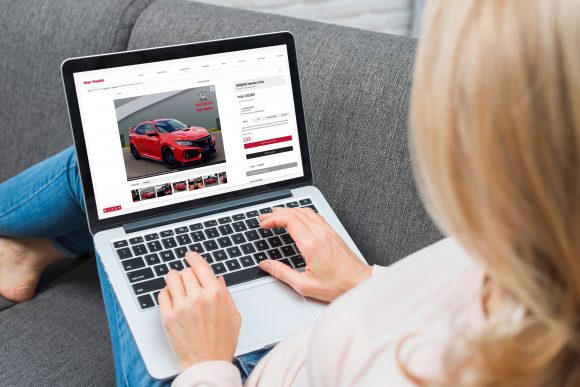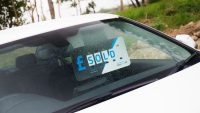Now car dealerships in England are open again will the trend of online car sales, home deliveries and click and collect ebb away as the lockdown eases?
It’s a question many dealers are asking as they weigh up investing in new websites and online sales solutions at the same time profits are squeezed and showrooms doors swing open again.
When Car Dealer Magazine discovered at the height of the crisis that the government was happy to let car dealers sell online and deliver to customers’ homes, there was a surge in interest for online sales solutions.
GForces told us it was running 400 per cent up in April such was the demand from dealer clients to have an online sales platform to keep them going during the lockdown.
But now, three weeks into dealerships in England opening their doors to a world of social distancing, contactless hand overs and red raw sanitised hands, do buyers still want to complete their transactions remotely? Or has the switch to digital faded as fast as the enthusiasm for homeschooling?
‘Covid has definitely acted as a catalyst for online car sales and many operational and cultural barriers to adoption have been blown away in a bid to keep the lights on,’ said GForces commercial director Tim Smith.
‘In recent years, pretty much every study on car buying habits has pointed to a latent demand for consumers’ desire to purchase vehicles online.’
Smith says car dealers have now seen the huge benefits selling cars online can have to their businesses.
Vertu Motors boss Robert Forrester reported to the Stock Market that it turbocharged its online sales solutions during the lockdown.
Although the dealer group has sold cars online since 2017, in May this year the system was enhanced, simplifying the process even further.
Forrester said this resulted in ‘record levels of purely online transactions completed’.
‘Consumers can now reserve a car for a fee online so effectively taking the car off-market while the deal is finalised with the dealership,’ explained Forrester in the group’s annual report. ‘Uptake of this functionality has been excellent.
‘It will now be more vital than ever before to have an omni-channel approach offering choice to customers between online and offline channels. The customer experience of the transition from online to offline (and return) must be seamless.
‘The group has moved a long way down this road in recent months which will lead to competitive benefits in the future.’
Not only are dealers now always open, but the cost of sale, as Forrester alludes to above, can be far less than a conventional one. As dealers up and down the country look to cut costs, online sales solutions could help there too.
Smith added: ‘It is definitely an opportunity to cut costs – an ecommerce platform can perform the entire sales function up to the point of handing the vehicle over removing enormous operational costs for the dealer.’
A combination of these cost savings and an explosion in demand for online sales, kick-started by the lockdown, and many believe this could be the revolution the industry has been waiting for for years.
GForces saw an 800 per cent increase in online sales by its customers since January as more and more dealers add the functionality to their sites.
‘Even if you look at customers who have been using ecommerce for six months or longer, the average number of transactions per month has increased over 300 per cent,’ added Smith.
800
percentage increase in online sales since January, says GForces
This growth is driven by consumers who still don’t really want to leave the house. After months of being told to stay at home, venturing out feels alien while shopping on their phones comes completely naturally – even when it comes to buying a car.
‘Our research showed that 76 per cent of consumers looking to buy a car are anxious about visiting a dealership in person, and half want minimal contact with a retailer,’ Ian Plummer, commercial director of Auto Trader, told Car Dealer.
He believes that this shift isn’t just about social distancing either – most customers have simply just got more used to buying everything online.
‘This means retailers will not only have to place greater focus on the quality of their digital forecourts, but they’ll also have to adapt their skills to better suit remote selling,’ added Plummer.
‘Rather than relying on face-to-face rapport, salespeople will have to become experts at hosting live video chats, virtual test drives, product walk arounds, and video handovers, as well as simply being more effective on the phone.’
These sales techniques will certainly present new challenges for dealers, but if they think they can be ignored the chances are they’ll soon get left behind.
‘A dealer who thinks online car sales was just a reaction to the pandemic is certainly wrong and probably in the minority I would say,’ added Karl Rahmani, owner of specialist web design firm The Whole Caboodle.
‘In our experience our clients and their clients want easier ways to buy and sell cars. Online purchase, either outright or reservation fees is here to stay and soon a complete end-to-end virtual purchase with little or no interaction with a dealer is going to become commonplace.’
Rahmani’s firm helped Batchelors Motor Group implement an online sales solution to its website during lockdown. Boss Tony Denton reported he sold 20 cars online in the first week of it being live.
Interest in Rahmani’s solution has boomed since lockdown and he is ‘hearing every day’ from dealers looking to use online sales to cut overheads.
He added: ‘I don’t think dealers have forgotten about online. The more forward thinking ones are looking at ways of maximising all opportunities and websites are being scrutinised right now.’
Codeweavers, another online sales specialist, has seen its dealer clients use digital sales to help boost their recovery.
‘Those who did take advantage of online sales are certainly not forgetting as reservations and orders are playing a significant part in their recovery,’ explained the firm’s Shaun Harris.
‘There were retailers who took advantage of lockdown to build their digital capabilities. If anything we expect to see more focus on this as the retail world, in general, adjusts to a new normal which sees far greater levels of digital retailing.’
However, Harris understands that as dealers look to save cash in a tough market, online sales solutions can help save money.

He added: ‘In a challenging environment, it’s natural for any company to look at their cost base and online ordering could help efficiency and reduce costs if it’s well integrated into their operations model.’
Web specialists Bluesky Interactive think the lockdown gave dealers the time to integrate online sales solutions and now they can begin to ramp them up.
‘Coronavirus has been the push the industry needed towards digital,’ said the firm’s Lauren Cooke.
‘A lot of dealers we have spoken to have been intending to investigate ecommerce and click and collect options for a long time, but the current crisis provided the catalyst and time incentive to make it happen.
‘It also means that dealers can embrace new technologies and processes in advance of full market uptake – meaning these dealerships will be fully equipped to handle it when buying habits change completely.’
Now with dealerships open again in England, and other nations following soon, most experts believe a combination of online and traditional sales will be the future – and the longer social distancing restrictions go on, the more used to this way of buying consumers will become.
Auto Trader’s Plummer added: ‘The physical experience won’t become redundant, far from it, as car buyers will favour a blended retail type model in which they can seamlessly transition between the online and offline experience even more than before Covid-19.
‘People vary as to which points of the process they want to engage with physically or digitally – there’s no one unique customer journey – but after three months of lockdown, where car buyers are looking for the most efficient, transparent and, crucially, the safest way to buy a car, the balance has definitely tipped on the side of online.’

GForces’ Smith thinks the showroom will still play a vital part in the sales process in the future, but its role will be very different.
‘Showrooms will still form part of the sales journey, but our view is they will become more the stage for the drama and excitement of a sales handover as opposed to the traditional site for doing the paperwork,’ he explained.
‘Showrooms should be about the positive experience of buying a car, not the drudge of filling in forms which can be done online.’
What many dealers are realising is that while digital sales were important before the lockdown, they’re now more vital than ever before – and there’s no chance of that switching back the other way again.
Plummer added: ‘Reassuringly, in most cases the reopening of showrooms hasn’t slowed the transformation to digital, and some retailers, both independents and franchise, have made some very big strides.
‘The majority of businesses have recognised that if they are to survive in this challenging new retail landscape, they have no choice but to embrace digital.’
Guide: How can car dealers get their website ready for online sales?



































